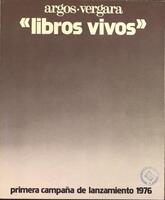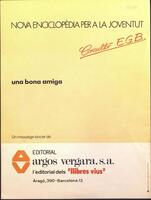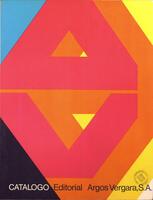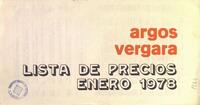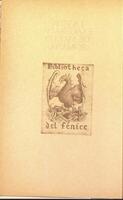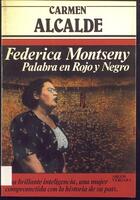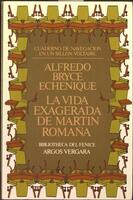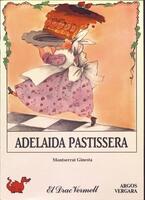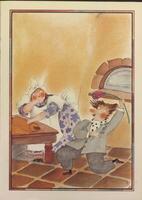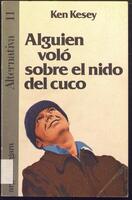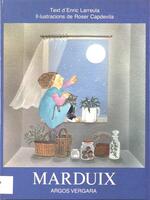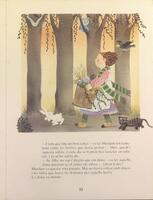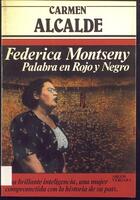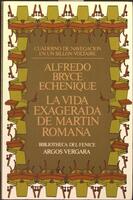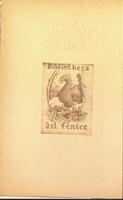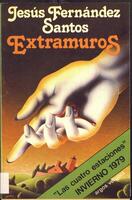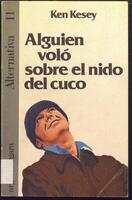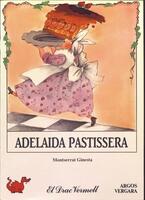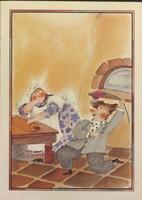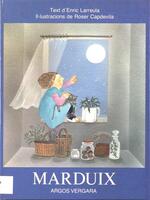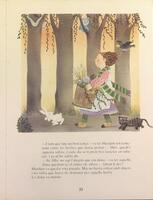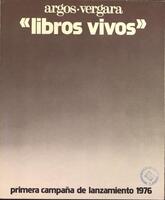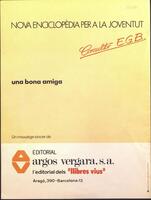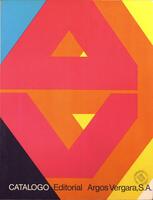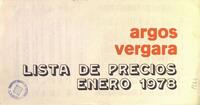Argos Vergara
(Updated 08/10/2024)
Argos Vergara was founded from the merger of two large Barcelona publishing houses, the bookshop-publisher Argos and the publisher Vergara, both of which were characterised by the diversity of their publishing output. Mario Lacruz, a literary editor from Plaza & Janés, where he would later return, took over the new company and started to build a new catalogue. One of his early ideas was to combine high-quality and commercial publishing without making a major distinction between the two.
+ informationSearch collections
The Biblioteca de Catalunya has the personal papers of Ignasi Agustí, the literary editor at Argos, and Josep Maria Boix i Selva, the literary editor at Vergara, back when these two publishing houses were different companies.
Ignasi Agustí collection at the Biblioteca de Catalunya
Josep Maria Boix i Selva collection at the Biblioteca de Catalunya
Catalogue of publishers and booksellers from the Bergnes de las Casas collection (Biblioteca de Catalunya)
Catalogues of publishers of Catalonia after 1976 (Biblioteca de Catalunya)
More information and documentation on the works produced
Llanas, Manuel. L'Edició a Catalunya. Segle XX (1939-1975) Barcelona: Gremi d'Editors de Catalunya, 2006
Vila-Sanjuán, Sergio. Pasando pàgina : autores y editores en la España democràtica. Barcelona: Destino, 2003
Argos Vergara
Description
Argos Vergara was founded from the merger of two large Barcelona publishing houses, the bookshop-publisher Argos and the publisher Vergara, both of which were characterised by the diversity of their publishing output. Mario Lacruz, a literary editor from Plaza & Janés, where he would later return, took over the new company and started to build a new catalogue. One of his early ideas was to combine high-quality and commercial publishing without making a major distinction between the two.
The new imprint continued with large-format works meant primarily to be sold in instalments, with general and specialised encyclopaedias and dictionaries. Stories and document books were gathered into collections like Libros Vivos, Libros DB, En Cuarto Mayor, Primera Plana and the original Las Cuatro Estaciones, while children’s books belonged to collections like El Drac Vermell and Els Llibres de la Gata (both genres appeared in Catalan, Spanish, Basque and Galician). The launches of some of these collections were accompanied by major advertising campaigns.
The publishing house, which was headquartered in Barcelona and had several offices all around Spain, also had direct representations, investee companies and branches in different countries in Latin America.
In 1994, Argos Vergara, along with the Labor and Toray publishing houses, all of them subsidiaries of the Telepublicaciones group, filed for suspension of payments.
Argos Vergara
Authors
Alcalde, Carmen, 1936-
Arenas, Reinaldo, 1943-1990
Bryce Echenique, Alfredo, 1939-
Capote, Truman, 1924-1984
Colette, 1873-1954
Delibes, Miguel, 1920-2010
García Márquez, Gabriel, 1927-2014
Gibson, Ian, 1939-
Ginesta, Montse, 1952-
Grass, Günter, 1927-2015
Greene, Graham, 1904-1991
Kesey, Ken, 1935-2001
Larreula, Enric, 1941-
Le Carré, John, 1931-
Lessing, Doris, 1919-2013
Malraux, André, 1901-1976
Mann, Thomas, 1875-1955
Nabokov, Vladimir Vladimirovich, 1899-1977
Roig, Montserrat, 1946-1991
Roth, Philip, 1933-2018
Waugh, Evelyn, 1903-1966
Argos Vergara
Collections
The large-format collections of encyclopaedias and dictionaries inherited from Vergara were joined by new ones such as the Argos Enciclopedia Temática and its Geografía Universal Ilustrada. Numerous collections were created, particularly featuring translated contemporary fiction, but also informative works, journalistic reports and children’s and young reader literature. Some of the collections were accompanied by major advertising campaigns.
Argos Vergara
Outstanding works
-
One of the titles in the Primera Plana collection
Alcalde, Carmen. Federica Montseny: palabra en rojo y negro. Barcelona: Argos Vergara, 1983.
-
First title in the Bibliotheca del Fénice collection supervised by Carlos Barral.
Bryce Echenique, Alfredo. La vida exagerada de Martín Romaña. Barcelona: Argos Vergara, DL 1981.
- Logo of the Bibliotheca del Fénice collection supervised by Carlos Barral.
-
Extramuros, first work of the Las Cuatro Estaciones collection, which won the 1979 National Fiction Prize and was made into a film by Miguel Picazo in 1985.
Fernández Santos, Jesús. Extramuros. Barcelona: Argos Vergara, 1978.
-
A film adaptation was made of the work Alguien voló sobre el nido del cuco (One Flew Over the Cuckoo’s Nest), part of the Alternativa collection, in 1975, which won five Oscars.
Kesey, Ken. Alguien voló sobre el nido del cuco. Barcelona: Argos Vergara, DL 1980.
-
Adelaida pastissera was part of El Drac Vermell, a children’s collection that translated its titles into Spanish (El Dragón Rojo), Galician (O Dragón Bermello) and Basque (Herensuge Gorria).
Ginesta, Montse. Adelaida pastissera. Barcelona: Argos Vergara, DL 1983.
Illustration by Montse Ginesta for the story Adelaida la pastissera, whose text she also wrote.
-
With Marduix, Enric Larreula earned the 1984 Serra d’Or Critic’s Prize for children and young reader literature. The story, which is part of the Llibres de la Gata collection, was illustrated by Roser Capdevila.
Larreula, Enric. Marduix. Barcelona: Argos Vergara, cop. 1983.
- Illustration by Roser Capdevila for the story Marduix by Enric Larreula.
- Libros Vivos catalogue from 1976, a collection promoted with a major advertising campaign.
- Catalogue of the Nova enciclopèdia per a la joventut (1980), a six-volume reference work targeted at schools with topics such as science, history, animals and plants.
- Catalogue of large-format works from 1981, primarily dictionaries and encyclopaedias.
- Price catalogues from 1978 and 1985.

